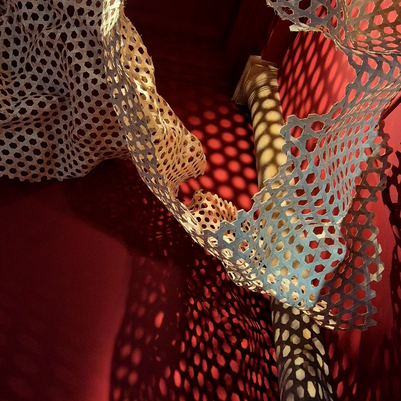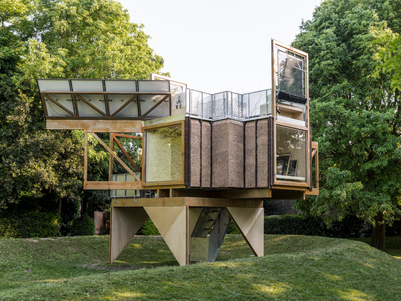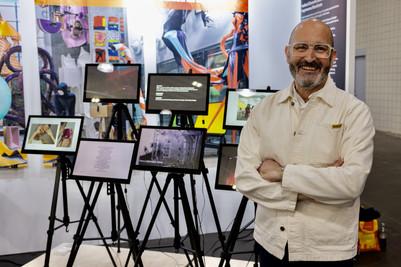
KLOTHING - Projects
Through various projects, KLOTHING explores three areas: research, artistic development practices and innovation.
Research
TRACE
TRACE
Contributing to Denmark transitioning from linear to circular economy before 2050 with a focus on plastics and textiles.
Participants: Else Skjold, Mette Dalgaard Nielsen, Rikke Stetter, Jesper Richardy, Linda Nyvang
Time: 2022-2028
A mission-based partnership consisting of Danish universities, knowledge institutions and public and private companies have joined forces in a series of politically funded projects under the Innovation Fund Denmark. The partnership accumulates action-based research with a focus on plastics and textiles across the entire value chain. It is driven by the ambition of establishing robust, resilient and climate positive sectors through active collaboration and knowledge sharing in the build-up of circular infrastructures. The role of the Royal Danish Academy is to ‘prototype the future’ through practice-led design experimentation, as well as systemic ways of driving larger transitions with design thinking as core.
Read more about the research project
Change4Circularity
Change4Circularity
Mapping Danish childrens wardrobes based on the largest data set to date.
Participants: Else Skjold, Jesper Richardy
Time: 2024-2027
Change4Circularity (C4C) will collect and utilize the hitherto most comprehensive data set on plastic pollution, household sorting and management of plastics and textiles waste in Denmark. This is done in the large-scale citizen science project Mass experiment, which will engage 30.800 school students throughout the Danish realm. KLOTHING is responsible for the textile study as well as policy recommendations on issues of assessments for environmental impact and quality of textiles. The project is funded by TRACE.
READY – R&D local micro factory on textile to textile recycling
READY – R&D local micro factory on textile to textile recycling
Reshoring capacity for textile processing and innovation on Danish soil.
Participants: Else Skjold, Kirsti Reitan Andersen, Linda Nyvang, Astrid Tolnov Larsen
Time: 2023-2026
READY’s main objective is to generate new knowledge about how new production technology can ensure responsibility in all stages of textile production. At the heart of the project is a local micro-factory positioned in Herning where the partner consortium is testing and developing test samples of recycled textiles as well as hemp textiles for potential industrial scaling. KLOTHING contributes with material-led partner workshop formats for knowledge accumulation as well as practice-led investigations of potential fit for purpose of the developed materials. The project is funded by the Innovation Fund Denmark.
MCC – Mass Customization for Circularity
MCC – Mass Customization for Circularity
How the fashion industry might implement more inclusive and diverse fit and sizing schemes in mass production.
Participants: Else Skjold, Rikke Stetter
Time: 2023-2025
The aim of this project is to develop a set of design ontologies for the variation of user niches and their stated preferences for fit and style. The specific objective is to develop a framework addressing mass customization for circularity in fashion. KLOTHING contributes with pattern construction prototypes for more inclusive fashion design. The project is funded by TRACE.
Read more about the research project
A handy craft: New perspectives on historical clothing and textile repair
A handy craft: New perspectives on historical clothing and textile repair
Exploring localism and textile craft heritage.
Participants: Trine Skødt
Time: 2022-2025
This PhD project forms an exploration of the intersection between the cultural history of textiles, clothing and handicrafts, and practice-led design research, and how this might contribute to future circular and sustainable practices. The project is funded by Royal Danish Academy - Institute of Architecture and Design and is partnered by the National Museum.
Read more about the research project
Blockchain, IoT and Resale
Blockchain, IoT and Resale
Does resale prolong the lifetime of fashion design?
Participants: Else Skjold, Mette Dalgaard Nielsen
Time: 2022-2025
Beskrivelse: This project aims at aligning and validating state-of-the-art of blockchain and IoT technology, as well as investigating user behaviour and economic flows on the current resale market. KLOTHING contributes with data-led insights (netnography + wardrobe studies) on parameters affecting value creation of resold garments. The project is funded by TRACE.
Read more about the research project
CHANGE
CHANGE
Environmental systems shift in clothing consumption.
Participants: Else Skjold
Time: 2021-2024
The overarching objective of the project is to examine consumption by investigating how people wear, change and replace clothes in Norway and globally in order to better understand the increasing volumes of clothing, and the potential to reduce them. The project is funded by the Research Council of Norway.
Read more about the research project
From Fibre to Form
From Fibre to Form
Investigating the intersection of textile circularity and design.
Participants: Astrid Tolnov Larsen
Time: 2018-2024
An exploration of the mechanical recycling of textiles and how the design qualities of fibres can be harnessed in the creation of nonwoven design materials for visual use in interior design. Through a combination of theoretical inquiry and practice-based studies, the project investigates the intersection of textile circularity and design drawing on historical as well as contemporary insights and cases. The project is funded by IBD and is partnered by Kvadrat-Really.
Read more about the research project
Regulation and Promotion of CE
Regulation and Promotion of CE
A review of textile assessment schemes and certifications.
Participants: Else Skjold
Time: 2022-2023
This project was based on a partner consortium of leading stakeholders and NGOs in the area of textiles policy in Denmark. The objective was to critically investigate the barriers and potentials for textile circularity and sustainability with particular focus on the validity of assessment schemes and EU policy development. The project was funded by TRACE.
Read more about the research project
SEWBOT – Roboticized sewing and handling.
SEWBOT – Roboticized sewing and handling.
Stimulating close to market product development for garments in Denmark.
Participants: Else Skjold, Rikke Stetter
Time: 2024-2026
This project connects research on user-led design development for diversity and increase of use phases for garments through testing close-to market product development between pattern construction, design dna and roboticized technology. The project is funded by TRACE.
Read more about the research project
Artistic development practice
Organic Print
Organic Print
Participants: Malene Kristiansen, Bitten Hegelund
Time: 2023-
This project investigates opportunities for colour scaling for industrial implementation with a base in native plants and historical practices.
Limited Edition – Refashioning the Unwanted
Limited Edition – Refashioning the Unwanted
Participants: Marcus Wilmont
Time: 2020-
This project investigates how the textile technique of hand pleating can foster more inclusive and universal fashion design, while at the same time offer opportunities for repurposing of discarded textiles through artistic development.
Read more about the artistic development project
Innovation
Longevity
Longevity
Participants: Kirsti Reitan Andersen, Mette Dalgaard Nielsen, Rikke Stetter
Time: February-December 2024
This project holds a larger consortium in which various design-led strategies for promoting longevity of garments are investigated – including aspects of technical, functional and emotional longevity. The outcome is a series of educational webinars to be launched in the fall of 2024. The project is funded by Lifestyle & Design Cluster/The Ministry of Research and Education.
Read more about the innovation project
Understand your user – strategic product design for circularity
Understand your user – strategic product design for circularity
Participants: Else Skjold, Kjetil Aas, Rikke Stetter
Time: 2023
This project investigates potentials for stimulating circular industry practices through a closer dialogue with product users. The KLOTHING team has worked with developing circular uniforms together with Rosenborg, a museum that is part of the Royal Danish Collection. The project entailed historical research in the museum archives as well as design and concept development, based on a series of material-led workshops with museum staff. The project is funded by Lifestyle & Design Cluster/The Ministry of Research and Education.









